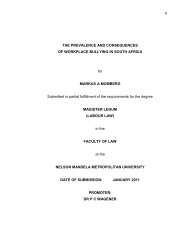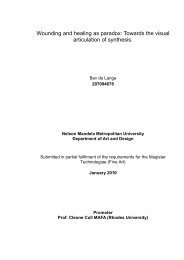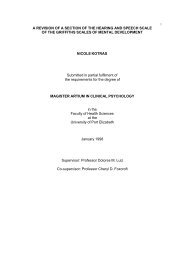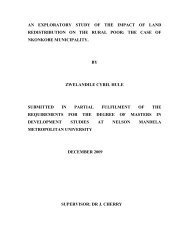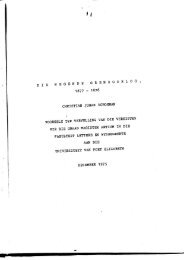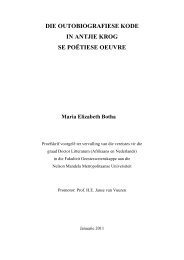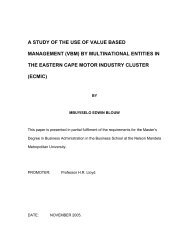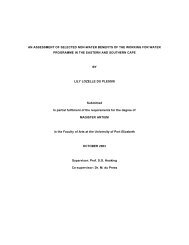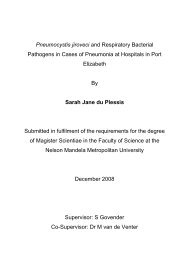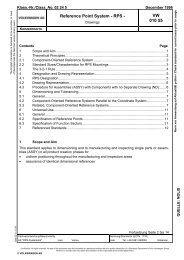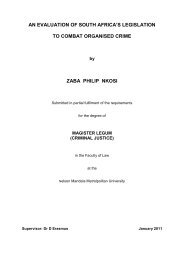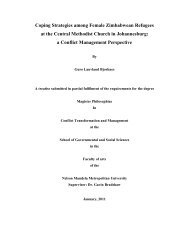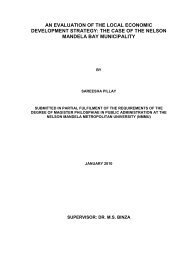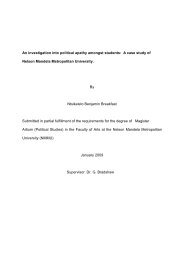Elaine Browne.pdf - Nelson Mandela Metropolitan University
Elaine Browne.pdf - Nelson Mandela Metropolitan University
Elaine Browne.pdf - Nelson Mandela Metropolitan University
You also want an ePaper? Increase the reach of your titles
YUMPU automatically turns print PDFs into web optimized ePapers that Google loves.
31<br />
that’s what we call, what is that, ... correlation, yes correlation that is what making things ... So you end up<br />
having someone who must do everything because everything has been introduced gradually and they got ample<br />
time to do it and and a space to do it. And the environment has got this influence on them that they do it as a<br />
result the competition that goes with it. There is no air of competition within our kids because it doesn’t mean a<br />
thing to them. They kind of ... The only way if, for a child to master something there must be a little bit of<br />
competition. So If I, I don’t care even if I win this or that because I don’t even know this. How am I going to<br />
master it? So there is no love of it, I can’t master it.<br />
T: Another thing I want to ... Arts and Culture is devided into 4 art forms. It is dance, drama, music and Visual<br />
Art. So I don’t think one teacher can be able to teach these four art forms. And no child can say I know all these<br />
art forms you know (U: And master them.) One couldn’t dance, another one drama et cetera, et cetera. I think<br />
that is another thing they must look at, to me. Or special ...<br />
U: Or no one knows a thing about them all, but does happen.<br />
V: You know whenever you suppose to give marks, I just multiply that 25 by 4 to get 100 and whenever what I<br />
have done, when we make a mask, I am going to multiply by ... to make it 100. So I, I am cheeting, this Arts and<br />
Culture. I am not doing this properly. That is not proper teaching. The learners must do something by<br />
themselves, not just push them and gave, gave them marks.They must, even when they play a game, they must<br />
bring arts ... arts materials everything, even do this thing, I know I am going to give out of 25, I must assess this<br />
child in Arts.<br />
U: And give the true reflection of the thing<br />
<strong>Elaine</strong>: So the assessment is not really working?<br />
U: Right enough, if someone love, like I love music and I, I’ve been singing, I’ve been dancing like when I was<br />
doing art at school, well I did those things. But at tertiary level when I, I was been trained as a teacher there<br />
wasn’t much that was been done. I knew, its only music that was done and for only one year. I was doing it for 3<br />
years but for only one year that I did music and the other 2 years were sport. So if this music, yes I know the<br />
music, I want to do it but where am going to get whatever to do it to the children like if only I’m, like even<br />
today. I’ve got short breath, I’m old, I am 45 years, I am short breath, I can’t sing to the children so they can take<br />
my voice and do it and imitate it because if they can, they can go on asking where’s the rest of your voice?<br />
<strong>Elaine</strong>: Now when you teach Arts and Culture, do the children respect you or do they know you don’t really<br />
know or how do you feel about that?<br />
U: Our learners first, they respect you as a teacher. They listen to you and they will do what you ask them to do<br />
for example. I was doing this, a colour‐in and they was very exciting to do this painting and they were doing it<br />
properly because I know a little bit and I got paint and brushes and they were keen to do that. But others and I<br />
would say, let’s go outside and do dancing, they enjoy that oh, especially when you do dancing or ...



